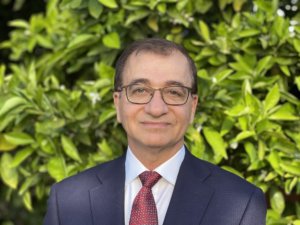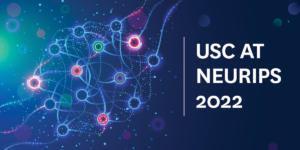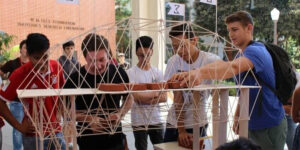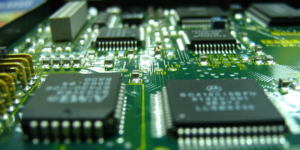
The USC-led DISCoVER Expedition Award instrumental role in developing more efficient computing solutions (PHOTO CREDIT: USC Viterbi)
Computing forms the foundation through which a wide range of societal challenges are being tackled: from automation to climate change. But the computing industry is at a crossroads with ever-increasing scaling challenges, and significant power demands. The continued growth of computing requires transformational technologies that can reduce power and enable groundbreaking discoveries of the future. It is with this challenge in mind that the U.S. National Science Foundation’s (NSF) Expeditions in Computing program has supported the DISCoVER Expedition team led by USC, along with a consortium of universities including Auburn University, Cornell University, Northeastern University, Northwestern University, University of Rochester, and Yokohama National University (the international academic partner). This is one of only two national Expeditions Awards announced this year.
“Both the 2022 awards support efforts that envision future materials for computing systems in a post-Moore’s law era,” said NSF Assistant Director for Computer and Information Science and Engineering, Margaret Martonosi.
The DISCoVER (Design & Integration of Superconductive Computation for Ventures beyond Exascale Realization) Expedition seeks to play an instrumental role in ensuring the preeminence of the US as a technological world leader and guide future hardware and chip manufacturing investments. To enable this leadership, the DISCoVER team will work towards transforming the way modern computing is performed by using superconductor electronics to design sustainable, large-scale, high-performance “exascale” computing fabrics.

Professor Massoud Pedram of the Ming Hsieh Department of Electrical and Computer Engineering leads the team (PHOTO CREDIT: USC Viterbi)
The DISCoVER team will focus on developing complete hardware and software solutions that enable the design, optimization, and demonstration of novel superconducting devices, single flux quantum logic circuits, and superconductive systems with very high performance and ultra-high energy efficiency, approaching the theoretical limit of energy efficiency. The team will focus on chips comprising superconducting Niobium-based “Josephson junctions,” which operate at a very cold 4.2 Kelvin and store (0 and 1) logic values by creating or removing persistent currents in superconducting loops. These loops exhibit zero resistance and thus, do not lose energy. This approach is a stark deviation from the current semiconductor design practices, which use silicon-based CMOS (complementary metal oxide semiconductor) transistors to process logic values.
This sort of computing power, the team believes, is an imperative for tackling complex computational problems that process massive scale data sets, such as those needed for drug development (that quickly show viability and impact), running models of climate change, or even problems like the supply chain.
The interdisciplinary team will be led by USC Viterbi Ming Hsieh Department of Electrical and Computer Engineering professor Massoud Pedram, whose research expertise is in green computing, low power electronics, and post-CMOS technologies. Specifically, the USC technical team, which includes Timothy Pinkston, USC Viterbi Vice Dean for Faculty Affairs and professor of electrical and computer engineering, and Murali Annavaram, professor of electrical and computer engineering and computer science, will focus on developing superconductive circuits and architectures that target a multitude of applications, including general purpose processors, neural network accelerators, Ising machines as hardware solvers of combinatorial optimization problems, and classical control for quantum computers.
The research effort being undertaken by partnering universities will work in tandem with the work at USC, and focus on novel material and devices, on-chip memory design, and interfaces to room temperature electronics to enable the design and prototyping of a superconductive system of cryogenic computing cores (SuperSoCC). The expectation is that the SuperSoCC will be capable of yielding at least 100 times improved energy efficiency compared to CMOS while delivering performance comparable to state-of-the-art semiconductor-based multi-core processing chips. In addition, the SuperSoCC can also deliver at least 10 times processing speed improvement at the same energy consumption level as CMOS-based computing. These performance gains are achievable in spite of the energy cost of required cryogenic cooling.
Through this multi-faceted research program, the DISCoVER Expedition will methodically lower the technological barriers to adoption of superconductor electronics, namely physical scaling, integration complexity, tool support, and interfacing with room temperature electronics.
Discussing the vast scope of this research Professor Pedram said, “With fundamental CMOS scaling limits close in sight, the time is ripe for an expedition to explore emerging disruptive computing technologies. The DISCoVER Expedition will explore novel superconductor electronics as a viable post-CMOS computing technology. Superconductor electronics can deliver ultra-high performance and energy efficiency at scale.”
DISCoVER team’s broader goal is to empower a new generation of diverse engineers and entrepreneurs who will bring superconductive devices and circuits to the mainstream of high-performance computing. To do this, the team will develop new curriculum for both higher education students and K-12 students, and they will lead significant outreach efforts to further broaden participation in computing.
“This DISCoVER Expedition will pave the way for seminal innovations in integrated electronics, sustainable exascale computing, and acceleration of machine learning,” said Pedram.
Additional USC faculty involved in this Expedition include Professor Yingying Fan of the USC Marshall School of Business and Professor Julia Albright of USC Dornsife College of Letters, Arts, and Sciences, who will be investigating the environmental, business, and socioeconomic impacts of superconductor electronics in general and the DISCoVER Expedition’s research in particular.
Published on April 22nd, 2022
Last updated on October 7th, 2022











